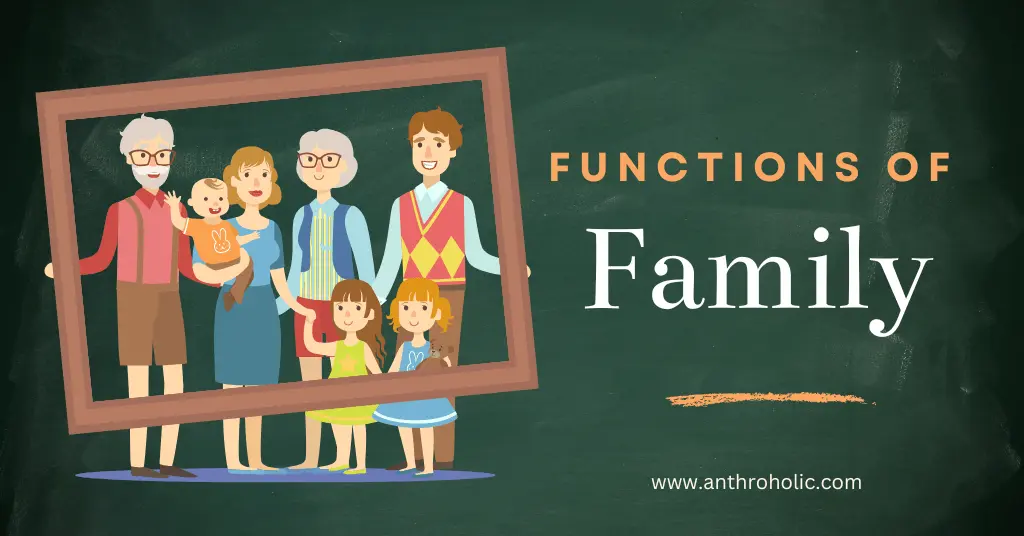AI Answer Evaluation Platform Live Now. Try Free Answer Evaluation Now
Functions of a Family
The family is often considered the fundamental unit of society, one that shapes our social, psychological, and emotional development from birth and beyond. It serves as the initial arena for socialization, education, and support, setting the stage for the individual’s engagement with the broader world. Despite the changing landscape of familial structures across cultures and over time, the basic functions that families fulfill have remained somewhat constant.

The Basic Functions of a Family
1. Socialization and Education
One of the essential functions of a family is to facilitate the process of socialization and education. From early childhood, family members inculcate values, norms, customs, and behavioral expectations that align with societal conventions (Macionis, 2011).
- Primary Socialization: This process involves teaching young children basic skills, manners, and language. It’s the first step towards understanding the social world.
- Secondary Socialization: This stage is about introducing children to larger social institutions, such as schools and religious organizations. It broadens their understanding of societal norms and values.
2. Emotional Support
A family serves as the main source of emotional support for its members, providing a safe haven where individuals can express and manage their feelings (Peterson & Bush, 2013).
- Emotional Buffer: Families help members cope with stress and adversity. They offer a cushion against the psychological impact of negative life events.
- Emotional Development: Families also foster emotional development. They teach children how to manage their emotions, nurturing skills like empathy and emotional intelligence.
3. Economic Security
Families traditionally ensure the economic security of their members. They provide food, shelter, clothing, and other necessities (Becker, 1981).
- Resource Allocation: Families allocate resources based on the needs of their members. This typically includes distributing income for food, shelter, education, and healthcare.
- Wealth Transmission: Families also play a role in transmitting wealth across generations. This can manifest in various forms, from inheritance to access to social networks and opportunities.
The Functions of a Family in Contemporary Society
In contemporary society, the functions of families have expanded and adapted due to factors like globalization, technology, and shifts in societal norms. The table below summarizes these new roles:
| Function | Description |
|---|---|
| Identity Formation | Families help individuals form their personal and social identities (Markstrom, 2011). This involves influencing one’s self-concept, values, and attitudes. |
| Cultural Transmission | Families transmit cultural heritage and practices across generations. They foster cultural continuity while also adapting to changing societal trends (Schönpflug, 2001). |
| Economic Support and Empowerment | Apart from basic economic security, modern families also promote economic empowerment. They support career development, entrepreneurial initiatives, and financial literacy. |
| Environmental Socialization | In the digital age, families also socialize members about the use and effects of technology. They establish norms for digital behavior and cyber safety. |
The Challenges and Evolution of Family Functions
Despite the foundational role of families in society, they face challenges that may alter their functional dynamics. Factors like economic pressures, changing social values, and technological disruptions can influence the way families operate (Amato, 2010).
- Dual-Career Families: The rise of dual-career families has shifted traditional familial roles and responsibilities. It has led to more shared household duties and child-rearing responsibilities.
- Single-Parent Families: An increase in single-parent families has brought new dynamics to family functions. Single parents often face higher demands in terms of providing emotional support and economic security.
- Digital Influence: Technology has transformed family interactions and socialization. While it brings families closer through virtual communication, it also presents challenges like managing screen time and cyber threats.
These changes show the fluid nature of family functions, demonstrating their adaptability to the societal landscape. Families are not static entities; they evolve to meet the needs of their members and society.
Conclusion
The functions of a family extend beyond mere survival and biological necessities. They are intricately linked to social, emotional, economic, and cultural aspects of human life. As society changes, so too does the function and structure of families, which adapt and evolve to meet new needs and challenges. Amid these changes, however, the family’s core functions continue to provide a critical foundation for individual and societal wellbeing.
References
- Amato, P. R. (2010). Research on Divorce: Continuing Trends and New Developments. Journal of Marriage and Family, 72(3), 650-666.
- Becker, G. S. (1981). A Treatise on the Family. Harvard University Press.
- Macionis, J. J. (2011). Society: The Basics (12th ed.). Prentice Hall.
- Markstrom, C. A. (2011). Identity Formation of American Indian Adolescents: Local, National, and Global Considerations. Journal of Research on Adolescence, 21(2), 519-535.
- Peterson, G. W., & Bush, K. R. (2013). Handbook of Marriage and the Family. Springer.
- Schönpflug, U. (2001). Intergenerational Transmission of Values: The Role of Transmission Belts. Journal of Cross-Cultural Psychology, 32(2), 174-185.



